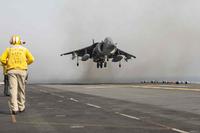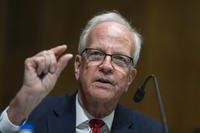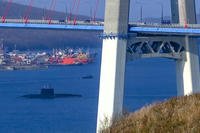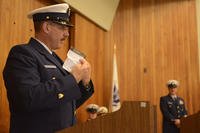The Navy again fired back at critics questioning if the money invested into "going green" will steal away needed funding from shrinking coffers without increasing sea power capabilities.
Tom Hicks, deputy assistant secretary of energy for the Navy, said it's quite the opposite at the Navy's League 2012 Sea-Air-Space Exposition. Investing in renewable energy and alternative fuels provides the Navy and Marine Corps better combat power. If the Navy reduces the nation's dependence on foreign oil along the way, that's great, but it's not the focus, Hicks said.
The Navy has received pressure from Congress to justify it's energy conservation efforts since a RAND report was published in January stating that biofuels will not help the Navy for at least another decade. The Navy continues its work to develop biofuels, but Hicks also pointed to the renewable energy work by the Marine Corps to help forward deployed Marines depend less on supply convoys.
Using solar panels, rechargable batteries and water purifiers, the Marine Corps can keep Marines in the field longer, Hicks said. Saving money on energy costs helps, but it's still about keeping these Marines less dependent on the dangerous convoys driven by troops and contractors in Afghanistan.
One Marine is lost for every 50 convoys driven. That's unacceptable, Hicks said.
President Obama set a goal for the Navy and Air Force to each achieve one gigawatt of renewable energy by 2020. Hicks said the Navy is on pace to reach that goal. The Department of Energy estimates that one gigawatt of energy could power 800,000 homes.
Pursuing alternative fuels and renewable energy will save the service money, Hicks said. The Navy spends between $4 billion and $5 billion each year to power its ships and aircraft. As budgets comes down, steaming and flying less is not an option, Hicks said.
He estimated that the average energy project for the Navy takes six to eight years before the service sees a return on its investment. Hicks understands that Congress is looking for savings wherever it can and is not eager to pursue additional spending without a quick pay back.
"Saving money is good but this is more about increasing military capabilities," he said.








